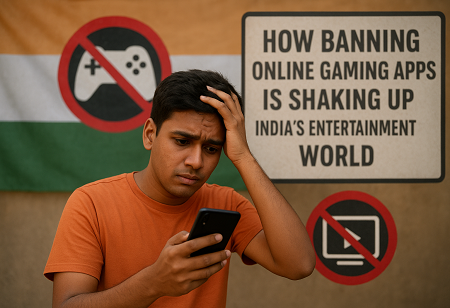From Advertising to Entertainment: India's Gaming Ban Sparks Transformation
In August 2025, the Parliament of India passed the Promotion and Regulation of Online Gaming Bill, the bill that banned all of the real-money gaming (RMG) applications in India, including PokerBaazi, Dream11, and Mobile Premier League (MPL).
This order and action by IT Minister Ashwini Vaishnaw prohibit any online game that involves the placing of bets using money, regardless of whether this activity is determined by luck or the skill of the gamer.
Violators may face up to 3 years in jail or a fine of up to Rs 1 crore. The government claims that the ban would address addiction, financial losses, and the matters of fraud and money laundering. This decision is causing a shock wave through the entertainment industry of India, touching on employment, advertising, and the ways people practice their spare time.
India’s online gaming marketplace is massive, with over 568 million players, making it the largest in the world. In 2024, real-money games, such as fantasy crickets or online poker, contributed 85.7 percent of the $3.8 billion revenue of this industry. Due to widespread smartphone usage, affordable internet connectivity, and backing of celebrities like Virat Kohli and MS Dhoni, the sector has seen rapid growth.
Also Read: From Aha to Chaupal: The Rise of India's Hyperlocal OTT Leaders
This has attracted major investments from global corporations like Tiger Global. However, the government cited the severe negative effects: addiction, suicides, and the destruction of peoples finances, as justification to ensure its ban. They further added that more than 1,500 betting sites had been blocked between 2022 and the middle of 2025.
Economic Shockwaves Across Gaming and Entertainment
The gaming industry is also taking a hard hit because of the ban. Organizations such as the E-Gaming Federation warn that more than 400 companies would go out of business, taking with them 200,000 jobs and billions in tax dollars. Shares of companies such as Nazara Technologies, which has a stake in PokerBaazi, fell almost 13% with the passing of the law. Others such as Probo went out of business already, and others are rushing to eliminate real-money functionality. Outside of gaming developers, this hurts coders, designers, and any support personnel that relied on these companies.
The implications however extend well beyond the gaming world. The entire entertainment industry is undergoing its transformation. Online gaming played an enormous role in the manner that people consumed digital content, particularly at times like the IPL, in which fantasy games are played by millions of people. Without these apps, individuals now will resort to other activities that entertain them, such as streaming, scrolling social media apps, or playing games that do not involve money.
The change could transform the way content is created and exchanged in India. “We stopped all paid contests on Dream11 and pivoted entirely to a free-to-play online social game... We have always been and will always be a law-abiding company and have conducted our business in compliance with the laws,” says Harsh Jain, CEO and Co-Founder of Dream11.
Also Read: The IMAX Experience: Revolutionizing Cinema Through Technology and Immersion
Advertising, Influencers, and Esports in Transition
Advertising is one big change. The real-money game companies shelled out a whopping Rs 17,000 crore annually in advertisements in sponsoring international sporting events, the IPL, to social media marketing. Without such money, websites such as YouTube and Instagram would lose revenue in advertising and sporting events could lose sponsors. Famous cricket players who have signed contracts with these apps might lose deals and this can spread through the sports-entertainment world.
Content creators are not spared either. Lots of YouTubers and other influencers grew their following through sharing game tips or promoting applications such as Dream11. The new legislation prohibits these promotions; thus, creators will have to go into redirecting.
Others can concentrate on esports, such as live streaming of PUBG or Valorant games, which are skills and not covered by the ban. Esports will increase as the law encourages it as one of the significant events in sports. This has the possibility of making esports as popular as traditional sports in India and as we have seen in the world.
To ordinary users, the ban alters the way people spend their time. Millions of gamers will have to kill time until the problem is fixed. However, there is a twist: the government fears that players will resort to illegal offshore gaming sites instead, which is more difficult to monitor and unsafe.
“Skill-based gaming is legal in most countries. In India, people pool money for cricket tournaments; why not digital skill games? The key is transparency and consumer protection. Arbitrary bans would disrupt this ecosystem and push users to unregulated platforms, which is riskier,” says Sai Srinivas, Co-Founder and CEO of Mobile Premier League.
The same has happened in states such as Telangana where there has been activities with underground gaming, thanks to similar bans. These websites, usually reached by VPNs, may lead to frauds or even to darker outcomes.
The Road Ahead: Crisis or Creative Rebirth?
The economy of the entertainment industry has also taken the toll Real-money gaming has generated Rs 20,000 crore of tax revenue and attracted foreign investment of Rs 25,000 crore and has created job opportunities in animation, visual effects and comics. The ban would drive investors into other nations, a step that would lower the advancement of innovation in digital storytelling.
On the other hand, it may lead companies to pay attention to quality games that are not associated with money. For instance, Krafton, producer of PUBG is in favor of more casual gaming, and this would result in more creative game designs and excellent experiences for the players.
A legal fight is also on the cards. The ban goes against earlier rulings of the courts which said that skill-based games, such as rummy, are not gambling. Industry organizations are planning to go to the Supreme Court challenging that its law infringes on the right to conduct a business. In the case the law stands, it may pave the way to cracking down other forms of digital lifestyles that may bring the entertainment industry to healthier, eco-friendly content.
In the immediate scenario, the ban is causing disruption - job losses, reduced advertisement expenditures and angry sportsmen. However, it may give a healthier virtual world in the long term. Esports and non-money games may become even more successful, and the content creators can find new forms of popularizing the work.
Also Read: Digital Despair: How News Platforms Are Fueling the Doomscrolling Epidemic
Streaming services and social networks would experience a boost in the number of users, making them in need of new programs, videos and interactive content. The Indian media and entertainment industry is at a transition stage, and these changes will define the future of entertainment to the millions in India. With supply and demand rebalancing, companies and creators will want to innovate to keep India hooked on new, exciting experiences.
🍪 Do you like Cookies?
We use cookies to ensure you get the best experience on our website. Read more...






